Mali is a landlocked country with nearly half of the highly dispersed population living in extreme poverty. Approximately 60 percent of people live in rural areas and most Malians work in agriculture. Economic activity is concentrated near the Niger River and 65 percent of the total land area is desert or semidesert. The country’s location and dependence on agriculture make it particularly vulnerable to conflict and environmental variability.
GLOBAL HEALTH
USAID has partnered with the Ministry of Health and Social Development, civil society, and the private sector for over 60 years and remains Mali’s largest bilateral health donor. USAID’s health programs focus on strengthening communities’ capacity to protect their own health and strengthening the health systems that underpin successful expansion of, access to, and use of high impact primary health care services in the areas of maternal and child health, voluntary family planning, and disease prevention and control. USAID is the lead United States Government (USG) agency in public health programming in Mali, and coordinates other USG actors such as NIH, CDC, and DOD in the implementation of several U.S. Presidential Initiatives; namely, the President’s Malaria Initiative (PMI), the President’s Emergency Response to AIDS Relief (PEPFAR) and the U.S. support of the Global Health Security Agenda (GHSA), including COVID-19 and Ebola preparedness and response. USAID/Mali health programs cover three quarters of all health districts in the country accounting for 17 million people, 80% of Mali’s population.
AGRICULTURE AND FOOD SECURITY
We increase food security, agricultural productivity, and market systems. Our Feed the Future program invests in value chains for cereals (millet, sorghum, rice, and maize), livestock (cattle, sheep, and goats), and horticulture which play vital roles in nutrition and household resilience. The program also highlights improved links between farming families and agricultural market actors, daily dietary diversity, and improved nutrition. We further seek to bolster the capacity of the agricultural private sector through improved access to credit, public private partnerships, and investments in productive uses of water, including small scale irrigation.
DEMOCRACY, HUMAN RIGHTS AND GOVERNANCE
Our programs increase public accountability and trust in government by focusing on good governance, rule of law, human rights, civil society, and conflict mitigation. Through our support, Mali’s citizens better engage with their governance and justice sector institutions, and civil society is supported to play a greater oversight role in ongoing reforms. We also assist Mali’s political transition to institutionalize more inclusive, effective, and democratic political governance by improving the capacity, integrity, and transparency of Mali’s electoral system to hold credible elections.
WORKING IN CRISIS AND CONFLICT
We provide critical programs that offer essential humanitarian assistance and conflict mitigation. We also build resilience among vulnerable communities, such as those prone to conflict, recurrent crises, and extreme poverty. Our activities aim to provide basic health, nutrition services and food assistance, and to build more stable communities, create and diversify economic opportunities, and reduce tensions that can be exploited by extremist and organized armed groups.
EDUCATION
We work to expand access to quality basic education by improving early grade reading, increasing community engagement for enhanced accountability and learning outcomes, supporting girls’ education, and removing barriers to education for children with disabilities. Overall, we emphasize more equitable access to education for under-served children and youth, including in conflict affected areas.

